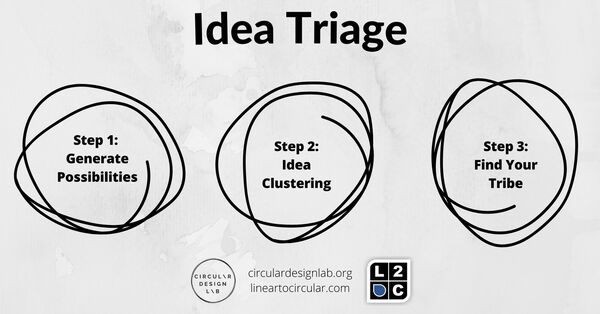
Idea Triage
This template helps participants self-select into topics of interest to form groups, rather than being assigned.

Version 1.0 (December 2020)
Overview
Idea Triage is a quick exercise that allows participants to self-select into a group with a shared interest to work on, instead of being assigned a group at random or based on other factors. We find it helps get people engaged early in the workshop as they find their tribe.
Why use it?
The tool doesn’t take much time, and it’s easy to use. It also gives agency to participants and works as a nice bridge from ice breakers to topic-specific exercises.
Who is it for?
Facilitators and teachers are obvious targets, but it could be useful for anyone who’s leading an event where several people need to be put into groups, and there’s time to have them self-select into topics of interest.
How long does it take?
A quick version can be done in 10-15 minutes. This typically can work for smaller groups (20-25 participants), especially if they’re generally comfortable with a bit of ambiguity and engaging in a workshop setting. Longer versions with more participants and/or the pitching option for Step 3 can take 30 minutes or more.
How many people is it for?
It’s typically used for workshops with 20-40 participants, but has been used with larger groups. (Larger groups tend to take more time to get through the process of idea sorting and selecting.)
What materials do you need?
For in-person events, post-its are necessary as a mobile mode of conveying ideas. Pencils, pens, or markers are also needed. Aside from that, a whiteboard, chalkboard, flip board, or open wall space that’s large enough to handle a few ideas from each participant, with space to move them around, is all that you need.
You can upload our template in an online whiteboard program and interact directly with it for online events.
What does the facilitator need to know or be able to do?
No particular skills are needed to facilitate this tool. The most important thing to do is think through how you’ll do Step 3 (Find Your Tribe), as this step can be handled in various ways. If time is tight, we typically call out each of the idea groups in turn and ask participants to do a show of hands for the ones they’re potentially interested in. Depending on how that turns out, you may have people quickly self-select into groups and be ready for the next activity, or you may need to either spend time with groups/individuals that are unsure or just give them time and space to work through it.
Acknowledgments
Chris Oestereich developed the Idea Triage tool for the Circular Design Lab and Linear to Circular.
Links
Share
Attachments
Tags
Share
-
Member

Georges Comby
-
Member

Timon Matzura
Berlin, Deutschland
-
Member


Hannah Lind
Vancouver, British Columbia, Canada
Post Graduate Diploma student in Professional Communication at Douglas College. Communicating the right things, in the right ways, matters to me. I am furthering my passion to make life-enhancing information more accessible with the use of ethical design and communication practices. My most recent post was as Bereavement Services Manager at Highland Hospice, where I led on the ethical redesign of our service to serve the needs of our community in its widest sense. This involved reflecting on what bereavement care is, who provides it, how we promote rather than undermine resilience, accessibility of support, how it can be accessed in local spaces, who potentially benefits and loses out and so much more. I’m deeply interested in my part in reshaping communities and societies to recognize our interconnectedness with each other, our surrounding environment and biosphere. I want to be part of the solution! Let's utilize AI in the right ways, for the right purposes!
-
Member


Karina Olavarria
Lo Barnechea, Región Metropolitana de Santiago, Chile
Soy Karina, me considero una ingeniera de los procesos de reemplazo. Soy una optimista.
-
Member

Tara Murphy
East Cork, Ireland
-
Member

Gentiana Nasi
City of London, England, United Kingdom
I am Gena; have lived in lots of places and am currently in London. I identify myself as a platonist and my focus is to dedicate my energy to "the true", "the good" and "the beautiful". Understanding the nature of reality and helping perpetuate the above triad with every decision I take can be undeniably challenging. Often intent guides actions, and I used to think that constant and conscious alignment with the intent is bound to derive the desired manifestation. However, our world is complex, and often the right intent isn't sufficient - our actions, although well intended, have unintended consequences and externalities, and the incentives society, business and culture project upon us often derive undesired results. This realisation has recently guided me towards learning more about systems thinking, complexity science, sustainability, circular economy and also to joining this community.
-
Member


Iliyana Nedkova
Edinburgh, Scotland, United Kingdom
Curating contemporary art since 1992 https://iliyananedkova.wordpress.com/
-
Member

Maureen Kilgour

